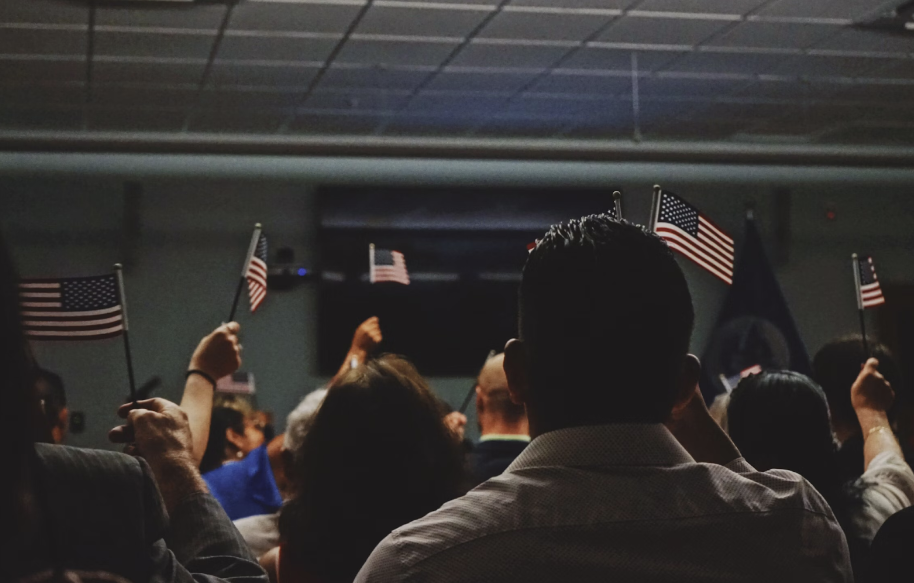Vice President Kamala Harris is officially the new Democratic presidential nominee, but what does this mean for migrants? With 2.6 million immigrants projected to arrive in the United States by 2025, immigration policy could play a major role in the country’s future. As the elections approach, how will Harris’ policies compare to those of Trump and her predecessor, Biden?
The United States has the highest number of immigrants worldwide, with 1 in 5 residing in the country. Today, immigrants comprise 13.6 percent of the population, almost three times as many migrants since 1970. Migration to the US saw an increase due to changes in policies such as the introduction of The Immigration Act of 1990. The Immigration Act of 1990 provided more avenues for legal immigration by facilitating the entry of certain groups for skilled work, broadening the categories for visa grants, and increasing the immigration cap. Since then, immigration regulation policies have shifted considerably throughout different presidencies and have become a major highlight of election campaigns.
Former President Barack Obama promised in his campaign to pass a major immigration bill within a year of his administration. He partially fulfilled his promise in 2012 when he announced the Deferred Action for Childhood Arrivals (DACA) executive order. The prosecutorial discretion provided renewable two-year grants to protect the approximately 700,000 undocumented people who arrived as children from deportation. President Donald Trump also used immigration law as a major campaign point, promising to limit immigration to the highest degrees. During his time in office, he made significant steps toward this by signing a travel ban that restricted the admission of citizens from Somalia, Libya, Syria, Iran, Yemen, Venezuela, and North Korea2, banning over 135 million prospective migrants and temporary visitors.
President Joe Biden, similar to President Obama, ran a campaign message sympathetic to immigrants. He vowed to reform immigration pathways, increasing lawful mechanisms to immigrate to the United States. However, Biden retained the Title 42 border policy created during Trump’s presidency, which allows the government to swiftly reject immigrants at the U.S.-Mexico border. Within a year of Title 42 ending, the Biden administration increased deportations under Title 8, the standard U.S. immigration framework, returning and removing 775,000 undocumented migrants— more than any past fiscal year after 2010. With 1.1 million deportations since October 2021, the Biden administration is on track to match Trump’s deportation figures.
The Biden administration’s significant deportation numbers, despite the president’s pro-immigration stance, could be due to congressional pressures. Biden’s promise to improve the immigration system was accompanied by an attempted temporary pause in deportations with the expectation that Congress would develop a citizenship procedure for undocumented individuals. However, the firm opposition of Republicans, fueled by the historically high number of border apprehensions in 2022 and 2023 created a constraining dynamic.
Despite several inconsistencies, the Democrats under Biden did produce some pro-immigration policies. Most recently, the administration announced it would be extending temporary protected status (TPS) for 18 months for up to 309,000 undocumented Haitian immigrants living in the United States. Before that, Biden announced new legislation to safeguard unauthorized spouses of U.S. citizens which would protect approximately 500,000 migrants from deportation.
As Vice President Kamala Harris begins her presidential campaign a look at her history can help reveal her stance on immigration. As vice president, she echoed Biden’s assertions that the immigration system needs to be improved. One of her mandates was to address the underlying causes of emigration from Latin America, such as corruption, violence and, impoverishment. In 2023, Harris announced $950 million in commitments from private corporations to aid Central American populations. 10 corporations including Target, Columbia Sportswear and Nestle pledged to support projects to create textile jobs, support farmers, and invest in communications technology among other industries. Despite this members from the Republican party have criticized her for the influx of unauthorized border crossings. Although Harris was in charge of directing the Biden administration’s diplomatic campaign to address the “root causes” of migration from El Salvador, Guatemala, and Honduras, she was not responsible for overseeing enforcement and immigration policy at the U.S.-Mexico border.
Some of Vice President Harris’ comments on immigration have been seemingly apathetic to the cause of migrant rights. Most notably her first visit to Guatemala in 2021 where the vice president gave a speech where she said to individuals considering immigrating to the US: “Do not come. Do not come.” The statement was regarded by several migration advocates as unsympathetic to conditions that cause individuals to flee their countries which was the very challenge the vice president was responsible for addressing.
The exact immigration policies Vice President Harris will set out to establish if elected are still unclear. However, there are hints that she may continue the legacy of Biden’s border crackdown. In an interview with CBS News, Julie Chávez Rodríguez, Harris’ campaign manager, was questioned on whether the vice president would retain the partial prohibition on asylum claims that President Biden established in June using a presidential proclamation. Chávez Rodríguez responded that the policies that have a meaningful impact on security and order at the border will continue. The partial ban on asylum claims disqualifies migrants who enter the U.S. unlawfully from asylum, halting the entry of the majority of migrants crossing the southern border. The policy has been credited for the progressive months-spanning drop in unlawful crossings at the southern border this year. Border Services are on track to see the lowest level of unlawful border crossings since the fall of 2020.
Former President Trump’s election campaign has featured bold claims about his plan to stop, prevent, and reverse migration. His campaign website states that he plans to “carry out the largest deportation operation in American history”. His platform promises that migrants who have entered the country unlawfully will be targeted starting with convicts. This will be done in addition to completing the construction of the Border Wall and increasing security checks for immigrant applicants. These policies appear to be an intensified version of his 2016 and 2020 election campaigns.
Trump argues that his plan to deport almost all of the 10 million undocumented migrants from the United States will lower crime rates, and increase the amount of jobs, including the ones that are higher paying, available to American-born U.S. citizens. However, economic research contradicts this point, estimating that the Gross Domestic Product (GDP) would decrease and inflation would increase.
Harris’ and Trump’s potential immigration policies contrast however some similarities exist in their approach. Vice President Harris supported increasing lawful migration but the administration retained and developed policies that mirrored Trump’s during his time in office. The major difference is in the degree of enforcement and policy focus. If Harris proceeds similarly with immigration policy to Biden, the implementation of policies that favour the protection of certain types of migrants over others may continue. Whereas if Trump proceeds in line with his campaign promises firm policies to limit undocumented migration may be a major focus.
Immigration policies under either administration will not only affect migrants but have the potential to alter the United States significantly. This includes the economy, societal treatment attitudes towards immigrants and diplomatic relations. Voters considering these policies will be deciding the future direction of the country.
Edited By Sofia Gobin

Theresa Decius-Timothée is in her fourth and final year at McGill University, currently pursuing a B.A. in Honours Political Science and a minor in International Development Studies. She is passionate about international relations, migration, and comparative politics in Canada and the Global South, with a focus on the Caribbean and Latin America.

